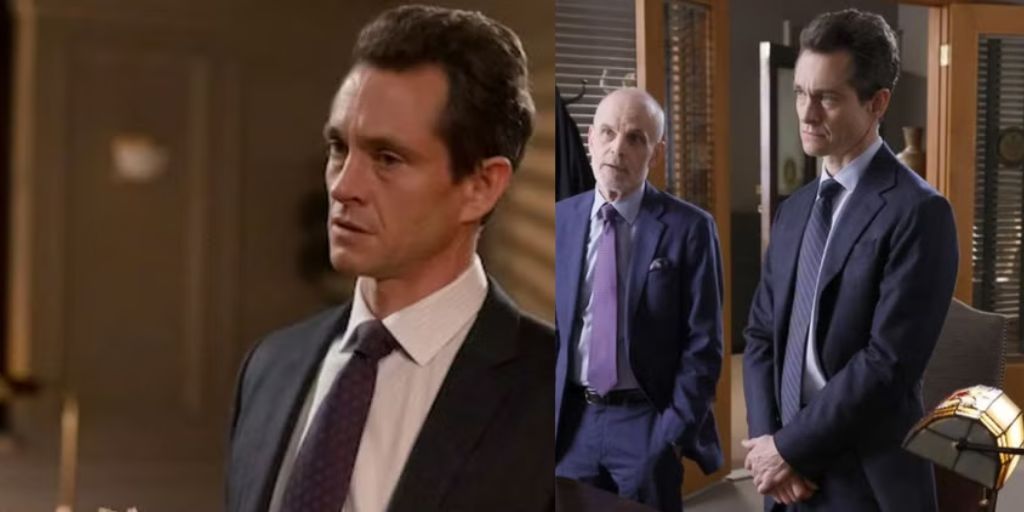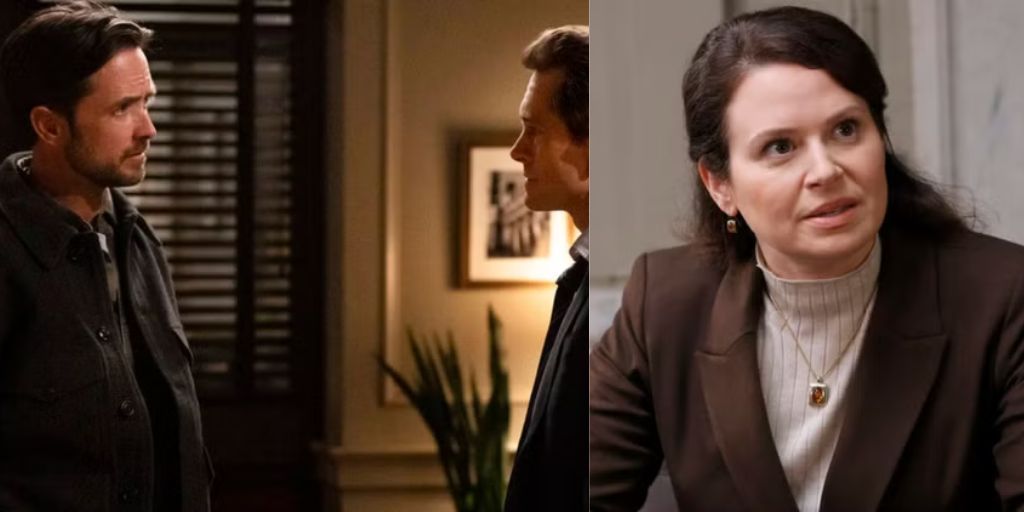Law & Order has been a defining show in television for many years. Over its 24-season history, it has perfected the structure of combining legal cases with police investigations.
The series has always made sure to present stories with depth, often showing the detectives and attorneys handling cases with professionalism and empathy. However, the show stands out the most when it blends the investigations with the personal struggles of its characters.
The latest episode, “The Hardest Thing,” is an excellent example of this approach. In this episode, Assistant District Attorney (ADA) Nolan Price, played by Hugh Dancy, works on a case about assisted suicide.
At the same time, he is dealing with a difficult situation in his own life—his father’s serious health condition. The episode skillfully connects these two storylines, making it one of the most emotional and impactful episodes of the season.
What Happens in Law & Order’s Episode “The Hardest Thing”?
Season 24, Episode 9 follows ADA Nolan Price as he prosecutes Victoria Beyer, a woman accused of killing her wealthy father. At first, investigators believed that financial gain motivated her actions. However, the truth turns out to be much more complicated. Victoria helped her father end his life at his own request after he was diagnosed with Pick’s disease, a severe form of dementia that affects the frontal lobe of the brain.
Nolan takes a firm stance on the case at first. He refuses to consider any kind of plea deal, arguing that a person cannot legally justify murder by saying, “He told me to.” He believes the law must be upheld, no matter the circumstances. However, as the case unfolds, he finds himself facing a deeply personal crisis. His own father is suffering from a serious illness, and he is forced to make a heartbreaking decision about his care.
This episode takes a unique approach by closely connecting Nolan’s personal and professional lives. The audience has already seen hints of his father’s declining health in previous episodes, especially since the end of Episode 4. Now, in Episode 9, Nolan’s brother, Thomas, played by Justin Chatwin, brings devastating news. Their father’s condition has worsened significantly, and they must decide how to proceed.
As Nolan struggles with this difficult situation, his emotions begin to affect his views on Victoria’s case. He starts to question his initial stance, realizing that decisions about life and death are rarely simple.
In the end, he changes his mind and agrees to offer Victoria a plea deal. At the same time, he and his brother decide to let their father pass away peacefully rather than prolong his suffering.
This episode is powerful because it highlights the emotional weight of such difficult choices. It showcases how personal experiences can influence even the most logical and professional individuals. The result is an episode that feels both realistic and deeply moving.
Hugh Dancy’s Performance Makes “The Hardest Thing” Stand Out
Hugh Dancy has been one of the strongest additions to Law & Order since the show returned to NBC. His character, Nolan Price, is usually known for his tough and determined attitude in the courtroom. However, in this episode, viewers see a different side of him. Instead of just being a determined prosecutor, he is also a son and a brother facing an impossible choice.
In an interview with TV Insider, Dancy explained that the show is beginning to show the personal aspects of its characters while staying true to its structured format. This approach allows for more emotional depth while still keeping the series grounded in its procedural style. “The Hardest Thing” is a perfect example of this change.
One of the most impactful moments in the episode comes from Nolan’s conversation with his brother, Thomas. Dancy and Chatwin deliver an emotionally charged performance, making the scene feel raw and genuine.
Their discussion about their father’s condition is something many people in real life can relate to. Watching Nolan struggle with his emotions, while also reconsidering his stance on Victoria’s case, adds complexity to his character.
This episode also raises thought-provoking questions about medical ethics, personal responsibility, and how the law treats cases involving assisted suicide. By showing how Nolan’s personal experiences influence his professional judgment, the episode creates a compelling and emotionally engaging story.
Why “The Hardest Thing” Is One of Law & Order’s Best Episodes
Law & Order has remained a favorite among viewers because of its ability to tell gripping legal stories. However, some of the best episodes go beyond the typical courtroom drama and show the personal struggles of the characters. “The Hardest Thing” is one of those episodes.
By focusing on Nolan’s internal conflict, the show delivers an episode that feels more human and relatable. It does not just tell a story about the law—it tells a story about difficult choices, family, and what it means to truly care for someone.
One of the reasons this episode works so well is that it does not take a clear stance on the issue of assisted suicide. Instead, it presents the complexity of the situation through Nolan’s personal and professional struggles. This allows viewers to think deeply about the topic without feeling like the show is pushing a specific viewpoint.

Another reason this episode stands out is its strong performance. Hugh Dancy brings an incredible level of depth to his character, making Nolan Price feel more real than ever before. His emotional journey in this episode adds layers to his character that were not as visible in previous episodes.
Additionally, the episode maintains the core elements that have made Law & Order successful for decades. It still follows a legal case, still presents strong arguments on both sides and still delivers a satisfying conclusion. But by adding a personal dimension, it makes the case feel even more meaningful.
Final Thoughts on “The Hardest Thing”
Episodes like “The Hardest Thing” remind viewers why Law & Order has remained one of the most enduring television shows. The best episodes do more than just follow a procedural formula—they create an emotional connection between the audience and the characters.
By showing Nolan Price struggling with his father’s condition while handling a case about assisted suicide, the episode brings depth and realism to the show. Hugh Dancy’s performance adds emotional weight, making it clear that Law & Order benefits from showing its characters in a more personal way.
This episode proves that personal stakes can enhance the drama, making the story more engaging while still staying true to the show’s legal themes. If Law & Order continues to show its characters in this way, it will remain as compelling as ever.




